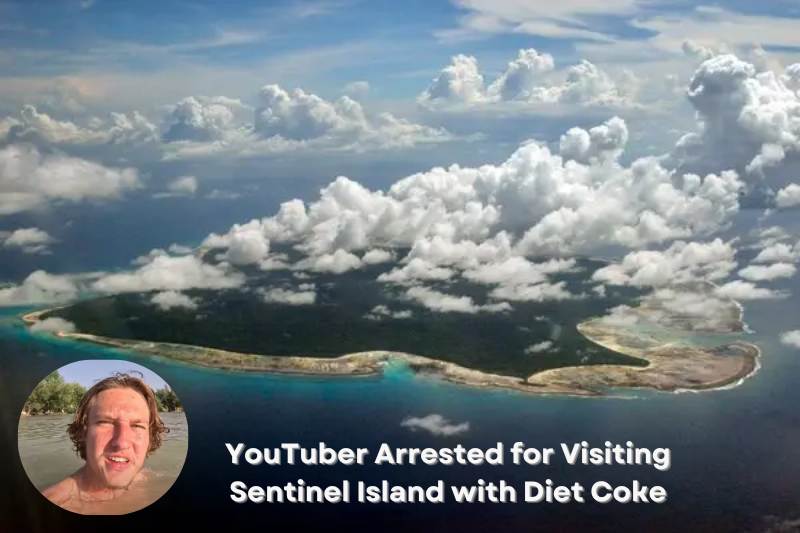
In April 2025, an American YouTuber was arrested for illegally visiting Sentinel Island, a remote and protected island in the Indian Ocean. What drew the world’s attention? He brought a can of Diet Coke and a coconut as an offering to one of the world’s last uncontacted tribes.
The Sentinelese people live on North Sentinel Island, part of the Andaman and Nicobar Islands in India. They are believed to be one of the oldest uncontacted tribes in the world — having lived in isolation for thousands of years. The Indian government has declared the island off-limits to protect the Sentinelese tribe from outside interference and disease. Visitors are banned by law. Even military aircraft avoid flying low over the island.
The YouTuber in question is Mykhailo Viktorovych Polyakov, a 24-year-old content creator from the U.S. He attempted to visit Sentinel Island three times. His first two attempts, in October 2024 and January 2025, failed due to intervention by Indian authorities. But in April, he finally succeeded in reaching the island — leaving behind Diet Coke and a coconut as "peace offerings" for the Sentinelese people. He also filmed parts of his journey, which he reportedly planned to post on social media. He was arrested shortly after returning and is now facing serious legal consequences.
The Sentinelese tribe is protected under India’s Andaman and Nicobar Islands Protection of Aboriginal Tribes Act. This is for good reason. The tribe has no immunity to diseases from the outside world. A visitor could unintentionally introduce infections that might wipe out the entire population. Even small illnesses like the common cold or flu can be deadly. Preserving the isolation of the Sentinelese people is not just about respecting their wishes — it’s about ensuring their survival.
This incident strongly recalls the 2018 death of John Allen Chau, an American missionary who also attempted to make contact with the Sentinelese tribe. Unlike Polyakov, Chau’s goal was to convert the tribe to Christianity. He paid local fishermen to take him near Sentinel Island, then used a kayak to get closer. The Sentinelese people responded with deadly force. Chau was killed with arrows, and his body was never recovered. His death sparked international debate about the dangers of contacting uncontacted tribes and the ethics of missionary work.
Sentinel Island is considered one of the most dangerous and protected places on Earth. The Indian government enforces a strict exclusion zone of five nautical miles around the island. This is meant to shield the Sentinelese people from outside contact and preserve their fragile ecosystem. Anyone caught trying to breach that zone can be arrested — as Mykhailo Viktorovych Polyakov learned the hard way. This is not about punishment. It’s about preventing history from repeating itself — like it did with John Allen Chau.
Human rights groups and indigenous protection organizations have condemned Polyakov’s actions. While his stunt may have been driven by curiosity — or content creation — it put lives at risk. The Sentinelese tribe has made it clear over generations: they want to be left alone. Polyakov’s Diet Coke offering wasn’t a peace gesture. It was a potential biohazard.
While the focus is on Sentinel Island, experts are also warning about other indigenous tribes at risk. The Shompen people, who live on nearby Great Nicobar Island, face threats from ongoing development. India’s proposed Great Nicobar Project includes ports, airports, and commercial zones — all of which could displace tribal communities and destroy fragile environments. The conversation around uncontacted tribes is bigger than one YouTuber’s mistake. It’s about how we protect these communities from modern dangers.
Whether it’s John Allen Chau, Mykhailo Viktorovych Polyakov, or anyone else — the message from the Sentinelese tribe has been the same: do not come here. The modern world must stop treating these tribes like mysteries to solve or spectacles to film. They’re not “lost.” They’re choosing isolation. And we must honor that choice — for their health, safety, and dignity.
Final Thoughts
This story isn’t just about one YouTuber and a can of Diet Coke. It’s about boundaries. About ethics. About how far people will go for attention — and what’s at stake when they do. As fascination with uncontacted tribes grows online, so does the need for respectful distance. Sentinel Island isn’t a destination. It’s a reminder: some places are sacred, and some people want — and deserve — to be left alone.